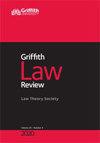The perils of personhood: a foreword
IF 0.9
Q1 LAW
引用次数: 1
Abstract
I am honoured to write the foreword for these new writings on legal personhood. I find them stimulating and provocative and I wish to rise to their provocations. They have pressed me to see law, and the idea of its subject, according to other world views. I want to engage with this new body of work, albeit briefly, and offer my counter provocations. There is a richness of material and ideas on offer here and a great range of themes, as the authors inquire into the legal status of corporations, people with a disability, children, and non-human life and entities. One concern I have is with the suggestion of several writers that natural entities, such as rivers, have intention and wisdom, even a spiritual dimension, and for this among other reasons should be recognised as persons. The reason for my disquiet is not the cosmologies themselves (after all we are all embedded in belief systems), but their invocation as a moral and legal basis of personhood. The problem is that this style of argument has an unwitting and unfortunate similarity to the approach adopted by influential British men to endow themselves with power via the concept of the legal person. For they too invoked a set of deep beliefs in their natural value and they were convinced that it made them quite naturally persons. In other words, (as the editors observe) the concept of the legal person has been used to consolidate the power of white Western men and they did so by claiming that by nature they were the right type of beings for personhood and legal subjecthood. Their idea was that educated white men had innately superior qualities which women lacked, and that law should follow nature; it should follow the man. Therefore, only men should be persons. Thus the concept of the person was openly deployed by the senior men of British law to advance the interests of their sex and to subjugate women. It was used by some of the most distinguished men of law who have remained revered figures in the legal pantheon. These men said explicitly that they as men were, in essence, natural and moral agents and they should therefore have the rights that such superior beings demanded. This claim to natural rightness and superiority was asserted without supporting evidence and yet it was advanced with total conviction. For this was how these men understood themselves to be. It was their belief system. The enduring effect of these deeply self-serving unconsidered convictions about male right has been departure from principle and the abuse of what might have been regarded as the natural rights of the other half of the population. The claims of male right have never been closely inspected, within mainstream jurisprudence, let alone made the subject of critical evaluation or apology. Personhood, therefore, has a worrying history. My continuing concern is that as grants of personhood are being sought for nonhuman beings and natural entities, to protect them from human depredation, the case for these grants of legal status is acquiring some of the cosmological dimensions that are to be found in men’s claims for themselves. Men saw themselves as inherently wise, rational, intentional and even spiritual agents, and so they were the fitting subjects of law. They reasoned from what they took to be their natures to law. From the 1860s to the 1920s, such statements were made clearly and forcefully in the so-called ‘person’s cases’ in which men of British law asserted exclusive rights to personhood for their sex.人格的危险:前言
我很荣幸为这些关于法律人格的新著作写序。我觉得他们很刺激,很挑衅性,我希望能接受他们的挑衅。他们迫使我根据其他世界观来看待法律及其主体的观念。我想参与到这个新的工作中来,尽管只是简短的,并提出我的反驳。本书提供了丰富的素材和观点,主题也很广泛,作者探讨了公司、残疾人、儿童和非人类生命和实体的法律地位。我所关心的是一些作家的建议,即自然实体,如河流,有意图和智慧,甚至有精神层面,因此除其他原因外,应该被视为人。我不安的原因不是宇宙论本身(毕竟我们都植根于信仰体系中),而是将其作为人格的道德和法律基础。问题在于,这种论证风格与有影响力的英国人通过法人概念赋予自己权力的方式有一种不知不觉和不幸的相似之处。因为他们对自己的自然价值也有一套深刻的信念,他们相信这使他们成为很自然的人。换句话说,(正如编辑们所观察到的)法人的概念被用来巩固西方白人男性的权力,他们这样做的方式是声称,从本质上讲,他们是人格和法律主体的正确类型。他们的想法是,受过教育的白人男性天生具有女性所缺乏的优越品质,法律应该顺应自然;它应该跟着那个人。因此,只有男人才是人。因此,“人”的概念被英国法律界的高级男性公开运用,以促进男性的利益,并征服女性。它被一些最杰出的法律界人士使用,他们在法律殿堂中仍然是受人尊敬的人物。这些人明确表示,他们作为人,本质上是自然的和道德的行为者,因此他们应该拥有这些高级生物所要求的权利。这种对自然的正确性和优越性的主张是在没有证据的情况下提出的,但却以完全的信念提出。因为这些人就是这样认识自己的。这是他们的信仰体系。这些对男性权利的极度自私的不加考虑的信念的持久影响是背离原则和滥用可能被视为另一半人口的自然权利。在主流法理学中,男性权利的主张从未被仔细审视,更不用说成为批判性评价或道歉的主题。因此,人格有一段令人担忧的历史。我一直担心的是,当人们为非人类和自然实体寻求人格的授予,以保护他们免受人类的掠夺时,这些法律地位的授予正在获得一些宇宙的维度,这些维度可以在人类对自己的要求中找到。人们认为自己天生就有智慧,理性,有意识,甚至是精神上的代理人,所以他们是法律的合适主体。他们从他们认为是自己本性的东西推理到法律。从19世纪60年代到20世纪20年代,这些声明在所谓的“个人案件”中得到了明确而有力的表述,在这些案件中,英国法律中的男性主张他们性别的专属人格权利。
本文章由计算机程序翻译,如有差异,请以英文原文为准。
求助全文
约1分钟内获得全文
求助全文

 求助内容:
求助内容: 应助结果提醒方式:
应助结果提醒方式:


